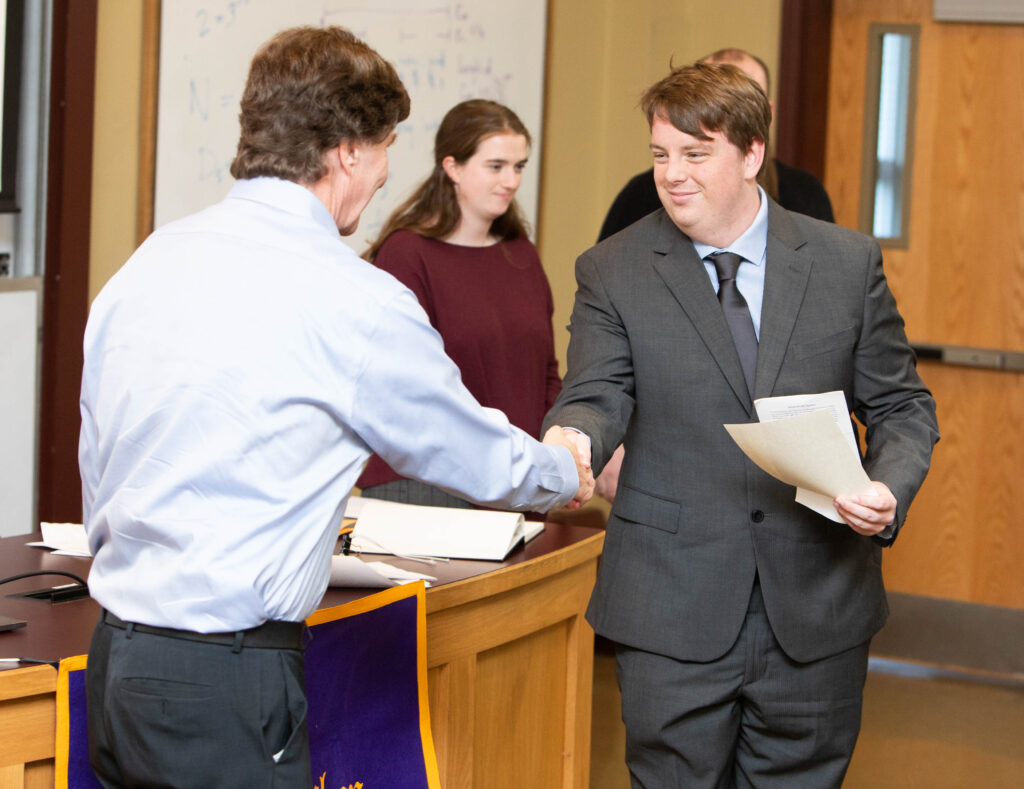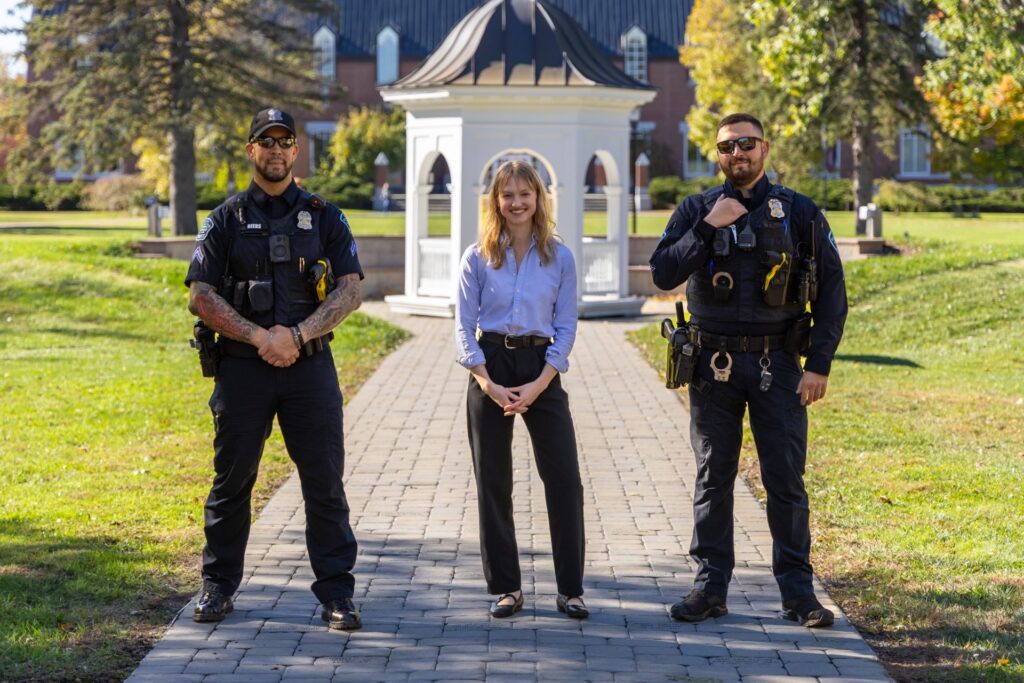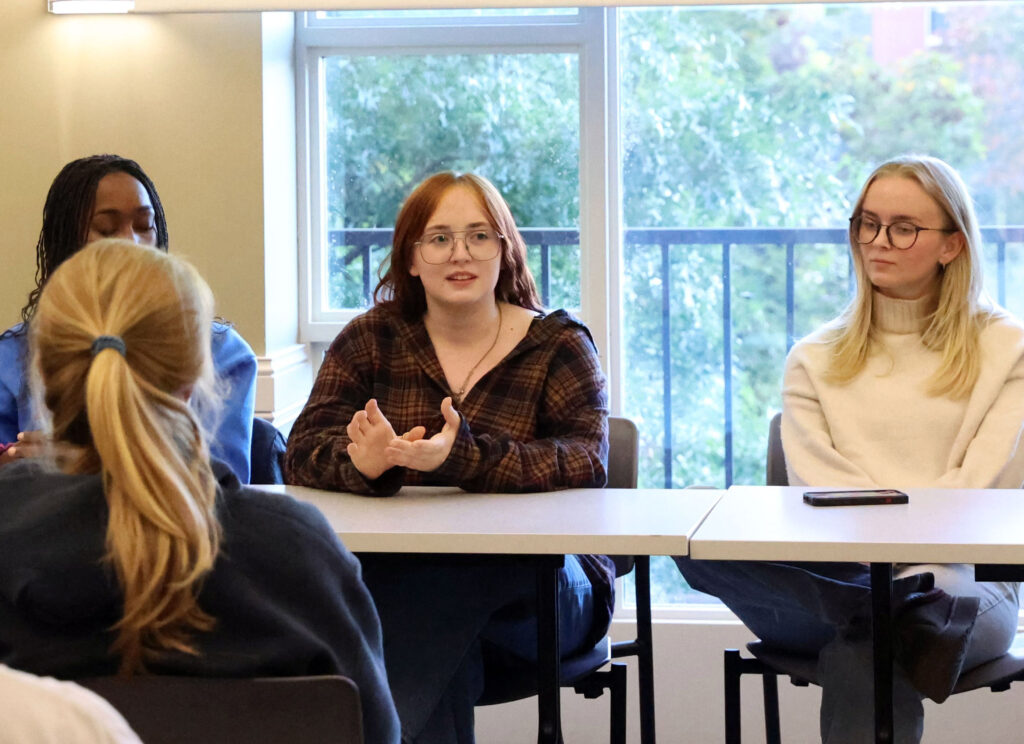Career Center office move benefits clients, counselors
New location in St. Edmund's places team squarely among heaviest student and faculty campus traffic; Director Peterson happy for all the great alumni connections of recent years cultivated from previous Alumni Center site

Outside their new offices in St. Edmund’s Hall last week are the Career Education Center team: in front, Director Ingrid Peterson, and behind her, career coaches Tim Birmingham ’02 and Laura Neville.
Saint Michael’s College Career Education Center Director Ingrid Peterson appreciates more than ever the real estate mantra about “location, location, location,” now that the Center has taken up new residence this month in St. Edmund’s Hall at the heart of campus.
As Peterson sees it, faculty and student connections are the meat and potatoes of her work, so being in the middle of the heaviest faculty and student traffic on the main academic building’s first floor (offices 126 through 133) will have immense value. The CEC is returning to the College’s Academic Affairs division after some productive years under Institutional Advancement in the beautiful and modern Pomerleau Alumni Center across the Route 15 from main campus.
Peterson, a career counselor at the College since 1994 through several relocations and reimagined delivery-service models, stressed that she likewise deeply valued the many advantages of her office’s most recent prior home since 2017 in Pomerleau — particularly the excellent alumni connections for student job opportunities that those years and nearby colleagues allowed.
In their new location, Peterson said, she and CEC colleagues Laura Neville and Tim Birmingham ’02 intend to preserve and build on those important and now-strengthened relationships even while making the most of the new closer proximity to their chief clients. The impetus for this recent move grew from conversations with Jeffrey Trumbower, vice president for academic affairs, and Krystyna Davenport-Brown, VP in IA, after both saw the value in career counselors being more directly among their campus clients physically, she said.
“Our partnerships with Academics has always been really, really important,” said Peterson, “and now to have just the organic conversations with faculty walking by or with students, it’s just been fabulous, even though it’s just been a couple weeks and classes have not even started yet. We’ve had some in-person student appointments already — and we’re also continuing to have virtual appointments.”
She said perhaps the biggest change for career counselors as an outgrowth of the pandemic — at Saint Michael’s and everywhere else — is a new emphasis on virtual meetings with clients rather than face-to-face.
“I think we probably will continue now with significant virtual service delivery,” said Peterson, adding that she meets every other week online with career center directors from all over the Northeast, “and every single one of them has said they agree that virtual delivery of our services is not going anywhere – it’s here, and an active component of what we’re going to be doing day to day.” For one thing, she said, virtual meetings solve the practical issue of having to wear a mask when meeting with a student as COVID continues to be an issue, and it is nice to see somebody’s face in a conversation.
Different approaches, locations
When Peterson arrive at Saint Michael’s in 1994, Career Counseling, as it was known then, was located in center-campus Klein Hall, now home to the main Academic Affairs offices. Edmundite Fr. Maurice Ouellette founded the office just as the 1970s began, “after the Edmundites decided it was something we needed,” she said. Ouellette was succeeded as director of the office by Dave Landers (later of the psychology faculty) and then Phil Jones, and Chris Clary, who retired several years ago when Peterson took over the director’s post.
“When I started here, we reported to Student Affairs, where it had been I believe since its inception,” she said, “and at that time we were a joint office with personal counseling in Klein. We did that until 2009, when my office started reporting to Academic Affairs instead even though we continued to share space in Klein with personal counseling.” Personal counseling now shares space with health stuff in the Bergeron Wellness Center.
Peterson said it was Karen Talentino (most recently of the biology/environmental science faculty) during her time as VPAA who put priority on linking careers more directly to academics. Later college leadership subsequently put a higher priority on linking alumni networks to career counseling. Peterson said she is grateful to have had both experiences, since now she feels so well connected to all constituencies, on and off campus.
“We always worked with the Alumni Office and made those connections, but for us to have a deeper understanding of how the Alumni and Advancement Offices operate in general has been really valuable – understanding the importance of relationship-building with alumni and how that ties back into IA is significant and valuable.”
Specializing for a deeper dive
Peterson said when she took over as CEC director, she revamped from a model where each counselor in the office was a generalist to one where each could specialize and thereby know more about particular popular career areas – maybe medical school, or MBA programs, or Peace Corps, she offered as examples – and thereby be more valuable to students with very specialized advice and connections. “We can do a deeper dive into helping each student on a particular interest,” she said.
The new office location also means that if a student has a particular question about classes and those classes’ relevance to a career or major, now the career counselor can just walk down the hall with them and ask a professor about it, or if a question arises about, say, Study Abroad in a career planning discussion, director Peggy Imai is just in the building next door instead of a long haul across a busy highway.
“Yesterday the RA’s came through here as part of a scavenger hunt to learn about campus, and we picked up on their genuine excitement about being able to stop here after class and ask a question with our new location,” she said. While the new space does not have a lobby area since “we’re in a hallway,” they are utilizing six offices, some with shared uses. “We have one for each of us three on the staff, one for our peer career adviser (students who will share space), space for Renee Davitt from Human Resources who will do a lot of on-campus student employment work here, and some chairs in another office that can be a waiting areas,” she said. “We also have space is set up so students can do virtual interviews.”
As far as programming in the coming semester, Peterson said each career counselor tries to do one larger program each semester based on student interest. For example, she talked with Paul Olsen from business about a possible program on the beer and brewing industry in Vermont; Tim Birmingham has talked with Professor Trish Siplon about a program on the Public Health major that Siplon directs, and another program might be with Daniel Simmons of the political science faculty, the new pre-law adviser.
Peterson’s message to parents and arriving students as the new semester approaches is clear and simple: “I would say come early, come often to see us – we are here to help,” Peterson said. “Whether you know what you want to do or don’t know, we can help you get started in that process. We’ll make an individual career plan for you, whatever you are trying to do.”






